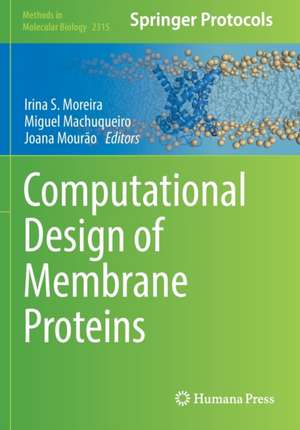Computational Design of Membrane Proteins: Methods in Molecular Biology, cartea 2315
Editat de Irina S. Moreira, Miguel Machuqueiro, Joana Mourãoen Limba Engleză Paperback – 26 iul 2022
Authoritative and cutting-edge, Computational Design of Membrane Proteins aims to ensure successful results in the further study of this vital field.
Chapter 4 is available open access under a Creative CommonsAttribution 4.0 International License via link.springer.com.
| Toate formatele și edițiile | Preț | Express |
|---|---|---|
| Paperback (1) | 730.79 lei 6-8 săpt. | |
| Springer Us – 26 iul 2022 | 730.79 lei 6-8 săpt. | |
| Hardback (1) | 1118.62 lei 6-8 săpt. | |
| Springer Us – 25 iul 2021 | 1118.62 lei 6-8 săpt. |
Din seria Methods in Molecular Biology
- 9%
 Preț: 791.63 lei
Preț: 791.63 lei - 23%
 Preț: 598.58 lei
Preț: 598.58 lei - 20%
 Preț: 882.98 lei
Preț: 882.98 lei -
 Preț: 252.05 lei
Preț: 252.05 lei - 5%
 Preț: 802.70 lei
Preț: 802.70 lei - 5%
 Preț: 729.61 lei
Preț: 729.61 lei - 5%
 Preț: 731.43 lei
Preț: 731.43 lei - 5%
 Preț: 741.30 lei
Preț: 741.30 lei - 5%
 Preț: 747.16 lei
Preț: 747.16 lei - 15%
 Preț: 663.45 lei
Preț: 663.45 lei - 18%
 Preț: 1025.34 lei
Preț: 1025.34 lei - 5%
 Preț: 734.57 lei
Preț: 734.57 lei - 18%
 Preț: 914.20 lei
Preț: 914.20 lei - 15%
 Preț: 664.61 lei
Preț: 664.61 lei - 15%
 Preț: 654.12 lei
Preț: 654.12 lei - 18%
 Preț: 1414.74 lei
Preț: 1414.74 lei - 5%
 Preț: 742.60 lei
Preț: 742.60 lei - 20%
 Preț: 821.65 lei
Preț: 821.65 lei - 18%
 Preț: 972.30 lei
Preț: 972.30 lei - 15%
 Preț: 660.49 lei
Preț: 660.49 lei - 5%
 Preț: 738.41 lei
Preț: 738.41 lei - 18%
 Preț: 984.92 lei
Preț: 984.92 lei - 5%
 Preț: 733.29 lei
Preț: 733.29 lei -
 Preț: 392.60 lei
Preț: 392.60 lei - 5%
 Preț: 746.26 lei
Preț: 746.26 lei - 18%
 Preț: 962.66 lei
Preț: 962.66 lei - 23%
 Preț: 860.22 lei
Preț: 860.22 lei - 15%
 Preț: 652.64 lei
Preț: 652.64 lei - 5%
 Preț: 1055.50 lei
Preț: 1055.50 lei - 23%
 Preț: 883.87 lei
Preț: 883.87 lei - 19%
 Preț: 491.89 lei
Preț: 491.89 lei - 5%
 Preț: 1038.86 lei
Preț: 1038.86 lei - 5%
 Preț: 524.16 lei
Preț: 524.16 lei - 18%
 Preț: 2122.34 lei
Preț: 2122.34 lei - 5%
 Preț: 1299.23 lei
Preț: 1299.23 lei - 5%
 Preț: 1339.12 lei
Preț: 1339.12 lei - 18%
 Preț: 1390.26 lei
Preț: 1390.26 lei - 18%
 Preț: 1395.63 lei
Preț: 1395.63 lei - 18%
 Preț: 1129.65 lei
Preț: 1129.65 lei - 18%
 Preț: 1408.26 lei
Preț: 1408.26 lei - 18%
 Preț: 1124.92 lei
Preț: 1124.92 lei - 18%
 Preț: 966.27 lei
Preț: 966.27 lei - 5%
 Preț: 1299.99 lei
Preț: 1299.99 lei - 5%
 Preț: 1108.51 lei
Preț: 1108.51 lei - 5%
 Preț: 983.76 lei
Preț: 983.76 lei - 5%
 Preț: 728.16 lei
Preț: 728.16 lei - 18%
 Preț: 1118.62 lei
Preț: 1118.62 lei - 18%
 Preț: 955.25 lei
Preț: 955.25 lei - 5%
 Preț: 1035.62 lei
Preț: 1035.62 lei - 18%
 Preț: 1400.35 lei
Preț: 1400.35 lei
Preț: 730.79 lei
Preț vechi: 891.21 lei
-18% Nou
Puncte Express: 1096
Preț estimativ în valută:
139.86€ • 145.47$ • 115.46£
139.86€ • 145.47$ • 115.46£
Carte tipărită la comandă
Livrare economică 14-28 aprilie
Preluare comenzi: 021 569.72.76
Specificații
ISBN-13: 9781071614709
ISBN-10: 1071614703
Ilustrații: XI, 290 p. 57 illus., 53 illus. in color.
Dimensiuni: 178 x 254 mm
Greutate: 0.54 kg
Ediția:1st ed. 2021
Editura: Springer Us
Colecția Humana
Seria Methods in Molecular Biology
Locul publicării:New York, NY, United States
ISBN-10: 1071614703
Ilustrații: XI, 290 p. 57 illus., 53 illus. in color.
Dimensiuni: 178 x 254 mm
Greutate: 0.54 kg
Ediția:1st ed. 2021
Editura: Springer Us
Colecția Humana
Seria Methods in Molecular Biology
Locul publicării:New York, NY, United States
Cuprins
Guardians of the Cell: State-of-the-Art of Membrane Proteins from a Computational Point-of-View.- Integrating Membrane Transporter Proteins into Droplet Interface Bilayers.- Membrane Protein Engineering with Rosetta.- Engineering of Biological Pathways: Complex Formation and Signal Transduction.p Homology Modeling of Class a G-protein-coupled Receptors in the Age of the Structure Boom.- Interface Prediction for GPCR Oligomerization between Transmembrane Helices.- Memdock: An α-Helical Membrane Protein Docking Algorithm.- Identification and Characterization of specific Protein-Lipid Interactions using Molecular Simulation.- Molecular Dynamics Simulation of Lipid-modified Signaling Proteins.- In silico Prediction of the Binding, Folding, Insertion, and Overall Stability of Membrane-Active Peptides.- pKa Calculations in Membrane Proteins from Molecular Dynamics Simulations.- Poor person’s pH Simulation of Membrane Proteins.- Preparing and Analyzing Polarizable Molecular Dynamics Simulations with the Classical Drude Oscillator Model.- In silico Prediction of Permeability Coefficients.- Identification of Pan Assay INterference compoundS (PAINS) using an MD-Based Protocol.- Transmembrane Anion Transport Mediated by Halogen Bonds: using Off-Center Charges.
Textul de pe ultima copertă
This volume provides an overview of the current successes as well as pitfalls and caveats that are hindering the design of membrane proteins. Divided into six parts, chapters detail membrane transporter, FoldX force field, protein stability, G-Protein Coupled Receptors (GPCR) structures, transmembrane helices, membrane molecular dynamics (MD) simulations, pH-dependent protonation states, membrane permeability, and passive transport. Written in the highly successful Methods in Molecular Biology series format, chapters include introductions to their respective topics, lists of the necessary materials and reagents, step-by-step, readily reproducible laboratory protocols, and tips on troubleshooting and avoiding known pitfalls.
Authoritative and cutting-edge, Computational Design of Membrane Proteins aims to ensure successful results in the further study of this vital field.
Chapter 4 is available open access under a Creative Commons Attribution 4.0 International License via link.springer.com.
Chapter 4 is available open access under a Creative Commons Attribution 4.0 International License via link.springer.com.
Caracteristici
Includes cutting-edge methods and protocols Provides step-by-step detail essential for reproducible results Contains key notes and implementation advice from the experts
